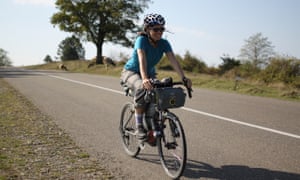When Tori Fahey packed in her job and embarked on a journey across Africa on her bike, what started as a hiatus from real life became the catalyst for an entirely new beginning.
On the surface, her story is almost a cliché. Having worked for more than a decade in finance (in the oil and gas industry in Canada), Fahey found herself wanting more from life. But it wasn’t through desperation that her circumstances changed: “I didn’t get fed up and storm off, nothing like that; it was curiosity about other interests and wanting to experience something new.”
Stage one was a return to education; Fahey left her job and completed an MBA before setting up a move to New York to begin a degree. However, the opportunity of an open year between the MBA and the degree came up, and as a keen touring cyclist, Fahey realised that a much dreamed-about adventure was now becoming a possibility: “The ride in Africa had been on my fantasy list. It was a moment when I realised that I could do anything, so I should. Things were happening in my personal life, and suddenly the life I might go back to in Canada wasn’t there anymore. Suddenly everything was possible.”
Fahey not only rode across Africa, a 12,000-km (7,500-mile) trip that took four months and traversed Egypt, Sudan, Ethiopia, Kenya, Tanzania, Malawi, Zambia, Botswana, Namibia and South Africa, but she also raced solo and unsupported the 4,200km from Banff in Alberta to Antelope Wells in New Mexico on two wheels, taking everything she needed for the trip with her.
The whole experience had a life-changing impact. Fahey is the first to admit she needed a shove in the right direction, but what is also clear is she is very much the architect: “It was a very liberating experience because there are so many things that you can’t prepare for that you have to figure out on the fly, and when you start to deal with the problems that come up it’s really, really rewarding to realise you can do anything.

“Before the trip, I considered myself quite independent, but I realised how much I valued interacting and enjoying experiences with people. The Canada-to-Mexico trip was very much a solo trip. You would spend a whole day not talking to anyone – and I realised from a biking perspective that tours I did in the future would be with people. It was an important part of the experience.”
Fahey also realised that, while people were important, material things were not. “I realised how little I needed and how to let go of material things. I had a real tendency to cling to things, various types of safety blankets, but I realised very quickly what I did and didn’t need. It was a very liberating experience, you have to figure things out on the fly and when you start to deal with the problems that come up, it’s really, really rewarding to realise you can do anything.”
Post-degree, Fahey worked on projects with the UNDP (United Nations Development Project) in Montenegro, the National Innovation Fund of Kazakhstan and the Caisse des dépôts et des Consignations de Tunisie; all with the aim of bringing venture capital and investment to rural or marginalised communities
It was while working on these projects that the seeds were sown for the next new venture. “It was through my trip from Canada to Mexico that I discovered pannier and rack systems and my revelation from the trip was that I was never going to use them again.”
So, in 2013, Apidura was born, producing storage solutions for people looking to travel the world by bike, race across continents and carry all they need to do so. It’s now a successful global brand, but Fahey remains reflective about what the company does. “It’s very different from my past life; the nice thing about the cycling industry is that you’re generally dealing with people who do what they love. So it can get hectic but you’re dealing with happy, honest, good people and that’s a really nice perk!
“Bicycles provide a literal freedom, but the emotional feelings are also so important; the types of feeling you really get when you push yourself on a bike … You don’t allow yourself to feel like that in everyday life because there are so many distractions, so when you feel happy or sad, you’re distracted by something, but when you’re out on the bike and there’s nothing else, you’re really free to experience what life is.”
Source: Read Full Article
